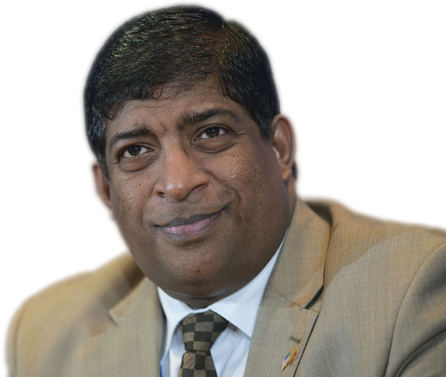Sri Lanka finance minister bemoans hurdles hindering clean-up job
Sri Lanka's new finance minister, Ravi Karunanayake, tells Stefania Palma that his attempts to improve the country's economic fundamentals are being hampered by legacies from the previous government, an unco-operative IMF and an international wall of silence when it comes to corruption investigations.
Sri Lankan finance minister Ravi Karunanayake’s frustration was obvious at the Asian Development Bank (ADB) annual meeting in Frankfurt in May. He was frustrated with the poor economic fundamentals left by the previous government; with the conditionalities attached to the newly approved $1.5bn International Monetary Fund (IMF) loan; and with advanced economies refusing to share information on potentially dubious money being funnelled out of the country.
When former president Mahinda Rajapaksa lost presidential elections to reformist Maithripala Sirisena in January 2015, Sri Lanka’s economic fundamentals were indeed weak. Between 2005, when Mr Rajapaksa took office, and when he stepped down in 2015, Sri Lanka’s gross domestic product (GDP) growth dropped from 6.2% to 4.5%, and net government borrowing skyrocketed from a deficit of SLRs156.75bn ($1.05bn) to SLRs692.97bn. In 2015, the fiscal deficit hit 7.4% of GDP – a key concern for the medium term, according to the IMF. And central government debt to GDP sat at 74.3% (as of 2014). About 40% of overall government debt is denominated in foreign currency.
A bad start
According to Mr Karunanayake, mismanagement and corruption under the previous government are to blame for the situation Sri Lanka finds itself in. “The [Rajapaksa government] was a democracy [where people] thought they’d be there for life. As a result, they fashioned it in a dictatorial manner. And the return was only corruption and not return to revenue of the government,” says Mr Karunanayake.
“You had a lot of illusionary [infrastructure] projects that came about that were politically natured. [The state] pumped in millions when the actual [project] cost was billions and you could see the balance going to corruption… That takes you to a debt crunch, where the debt servicing is higher than government revenue,” he adds.
Several members of the Rajapaksa family face investigation for alleged financial crimes, which they deny. The former president and his family claim the investigation is politically motivated.
Now, Mr Karunanayake is faced with the difficulty of cleaning up the government’s balance sheet while generating growth. “The new government… is confronted with opening the system up. When you do that… you [need to] pay what is expected and also [generate] the development that people are expecting. That was the biggest problem we inherited,” he says.
To help revive the economy and to avoid a balance of payments crisis, the IMF and Sri Lanka agreed on a three-year $1.5bn extended fund facility (EFF) – the country's second IMF loan since 2009. The EFF is subject to final approval by the IMF’s executive board in early June.
The EFF requires Sri Lanka to roll out “fundamental changes to tax policy and administration to reverse a two-decade decline in tax revenues and put public finances on a sustainable medium-term footing”, the IMF said in a statement. Sri Lanka will need to raise its tax-to-GDP ratio to about 15% by 2020 (from a current 11.7%) and cut the fiscal deficit to 3.5% of GDP by 2020.
Stony silence
Essentially, tax revenue has to increase while government spending has to be reined in. And to Mr Karunanayake, these conditionalities and the IMF’s inflexibility might be at odds with Sri Lanka’s socio-economic and political backdrop.
“You go to a bank at a time of need and if you come out completely bashed out then what is the purpose? Governments are elected by human beings and there is a sense of expectation. If you have not been [responsible for] running the economy down and you are bringing clean governance and fiscal discipline to the table… then why should you be punished? We discussed this with the IMF but [we were met with a] stony silence. [They have] the same judgemental factor on all countries,” says Mr Karunanayake.
Even though the Asian Infrastructure Investment Bank, the ADB and the World Bank have been more responsive to Sri Lanka’s commitment to change, their support was still contingent on an IMF approval. “Each one looks at whether you have the IMF endorsement,” said Mr Karunanayake.
A further priority for Mr Karunanayake is tracing dubious money leaving Sri Lanka as part of the new government’s anti-corruption drive. The main difficulty, however, lies outside the country’s borders.
“When we find that there has been a trail of money going out of the country, it goes in three or four countries [in Asia, the Middle East and Europe]. When you ask [these countries] to respond with banking information and numbers, there is stony silence. They pontificate [on] clean governance on one side when they don’t do it themselves… These are the areas that us developing countries need to grapple with. Sometimes the duplicity… is unbearable,” says Mr Karunanayake.



